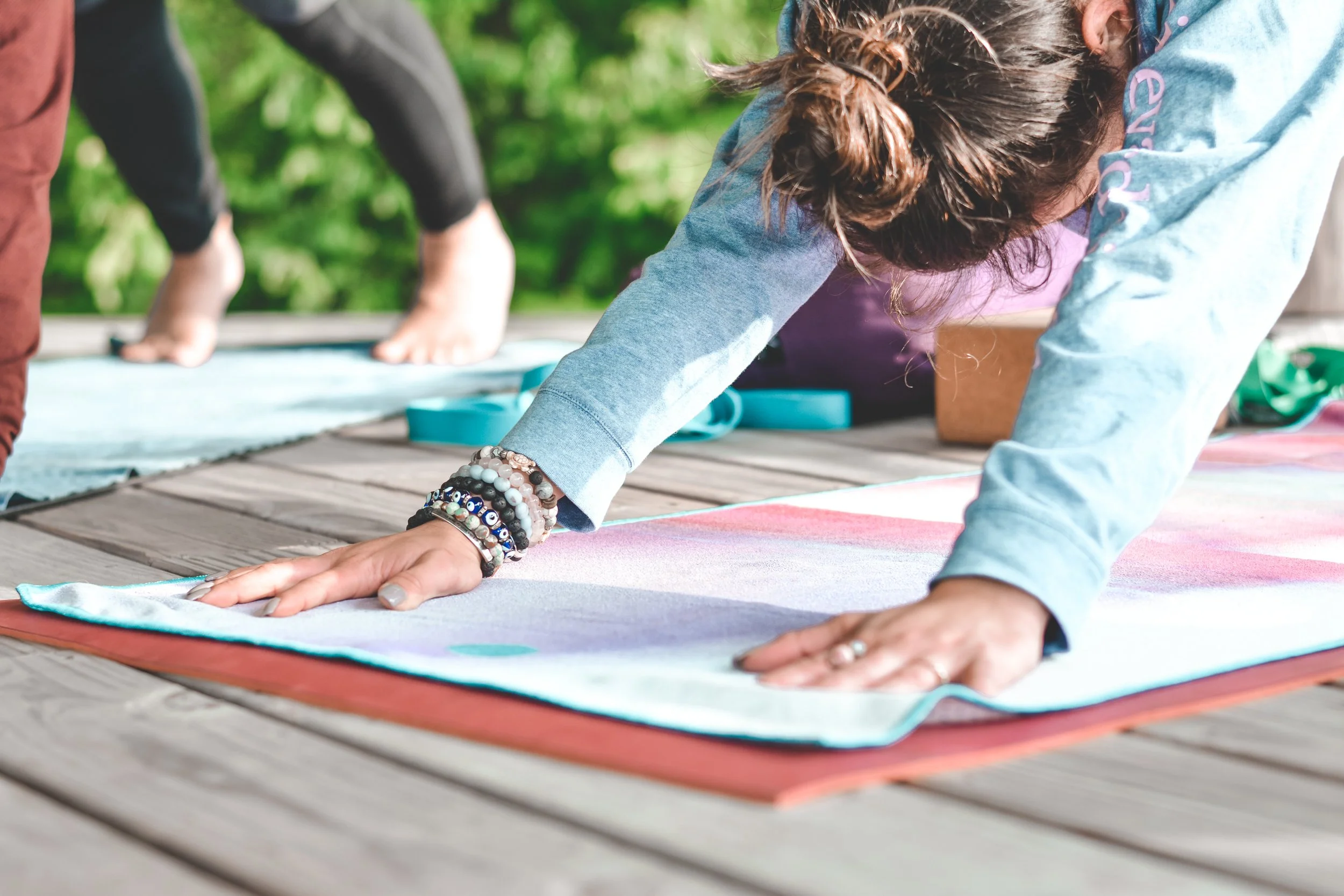
300 Hour YTT Information Guide
Welcome Packet
This guide will help you get ready for your Yoga Teacher Training and to make the best out of it, so read carefully!
MINDFULNESS DURING YOGA TEACHER TRAININGS
Yoga Teacher Training, especially in the retreat or immersion setting, can be a transformative experience that brings up issues from the tissues for processing and release. It often prompts noticing of the samskaras, or habitual patterns that are in operation in our lives, so that we can move to the processing stage.
If you are currently feeling emotionally vulnerable, please seek appropriate support before considering embarking on Yoga Teacher Training. If you feel emotionally vulnerable during the course, please seek a facilitator to help guide you in the process of unfolding to understand the deeper layers of Self. If you are currently receiving medical attention of any form, including psychotherapy, please ensure you have the approval of a medical professional to attend the course and inform your facilitators of your status and any medications that you are taking. Be aware that facilitators, while trained in coaching, yoga and support techniques, are not legal health professionals and are only able to offer assistance within the scope of their role as yoga teacher training facilitator.
We may at any moment take time out to discuss living and learning together and how we can move towards an optimal state of harmony during the program. Any behavior that is disrespectful or harmful to peers or teachers will not be tolerated at any time and facilitators reserve the right to request departure from the training if adequate shifts are not made. Our intention is to create a loving container for self-supported exploration and transformation. Please keep this in mind and aim to support this container through your words and actions within the space. Thank you so much for joining us on this journey!
YTT 300Hr Program of Study
100 hours: Form, method of teaching, benefits and cautions of principal asanas (postures), pranayamas (breathing techniques) and kriyas (cleansing techniques).
25 hours: Teaching methodology, including modifications for age and common injuries/conditions, how to create a grounded and inspired space for teaching/learning, the use of voice, prenatal yoga, learning to create various class-styles: beginner, intermediate and prenatal yoga: each class having either a very mindful, flowing sequence, or a more dynamic feel, depending on your nature as a yoga teacher, and the students present in any given class.
20 hours: Anatomy and the physical/mental benefits of yoga, Subtle Yogic anatomy and the Chakras.
5 hours: Introduction to Ayurveda, nutrition, and the Yogic diet.
30 hours: Ashtanga philosophy (the eight-fold path), Study and discussion of the Yoga Sutras of Patanjali, aphorisms giving insight into profound yogic practices and contemplations, as well as their life-transforming benefits.
20 hours: Teaching practicum and feedback from the trainers and your peers.
(GUIDED BY YA CERTIFICATION REQUIREMENTS)
300HR YTT Required Books & Readings
Anatomy of Spirit
by Caroline Myss
A helpful read for understanding mind body connection. You do not need to bring this with you to the course.
The Upanishads
Please bring any translation with you to the course. The more translations/perspectives we have, the better!
The Great Work of Your Life by Stephen Cope
or any translation of the Bhagavad Gita. Please bring with you to the course.
Oneness
by Rasha
Recommended but not required (it is a big read!)
Kula Collective Course Books
The Kula Collective Yoga Teacher Training manuals are included in the price of tuition and you will receive them in digital form.
Kula Assessment & Certification
In order to meet Yoga Alliance standards for certification, your attendance will be required at all sessions during the training program. If you miss more than three sessions of the course due to illness or non-participation, you can arrange for private tuition with facilitators who will be able to make up time with you via one-on-one hourly sessions, so that you remain eligible for certification according to YA standards.
We reserve the right to certify only students who attend and are actively participating during all required hours, who pass the practicum for safe teaching and demonstrate an ability to facilitate and communicate effectively with a group in a class setting. In the case that you do not receive the certificate directly, we offer a mentorship program to help students achieve certification.
Teachings & Learning
-
We will assign various reading assignments from the manual throughout the course. You will also be asked to answer some questions for reflection at the end of each of the three cycles, ideally the first session on the last day of each cycle, or be provided with another similar form of assessment. This helps you and the facilitators know whether you are spending enough time reviewing the concepts learned in the course, or whether you need to increase the intensity of your study and class participation.
-
As part of the 300-hour training, you will complete three teaching practicums, each a 75–90 minute class, designed to progressively deepen your skills and expression as a teacher. Each practicum will focus on a different area of refinement:
Technique-Focused Practicum
Centered on clarity of cueing, alignment principles, breath awareness, and effective use of space. This practicum allows you to demonstrate your understanding of the foundational techniques and safe teaching practices.
Sequencing & Theme Weaving Practicum
In this class, you’ll integrate intelligent sequencing with a cohesive theme, using language, pacing, and class structure to guide students through a meaningful and embodied journey.
“Share Your Essence” Practicum
A culmination of your training, this practicum invites you to step fully into your unique voice as a teacher. You’ll design and lead a holistic, therapeutic class that weaves together the tools, insights, and healing modalities explored throughout the course—offering your most authentic expression of yoga.
Each practicum is a chance to embody what you’ve learned, receive constructive feedback, and grow in confidence and presence.
-
We hope that you enjoy the course and feel that we are all working together as a yoga community in the scholarly study, esoteric practice, devotion and service of the propagation of yoga. If you have any concerns related to the course, please communicate with one of the facilitators right away so that we can address them or help you to work with the issues.
Please be conscious of your facilitator’s time, and first look within to make any inquiries you may normally be quick to voice. Seek nature to see if your questions can be answered, then next discuss your queries with your peers to develop greater perspective, before seeking guidance or counsel with the facilitators for any questions that do not directly affect the running of the program.
-
Review your notes at least one hour per day, and do all the readings and activities assigned for homework
Respect the space and location, keeping it conducive for spiritual growth and learning. Walk quietly and meditatively to and from classes and maintain inward inquiry during personal sadhana periods
Observe mouna (silence) when requested
Do not force the asana poses for any reason
Be on time to class
Sit in class in any comfortable position, keeping the spine lengthened and neutral to maintain awareness and energy levels
Participate fully in pair work or group activities, as well as asking questions at the end of lectures.
Listen respectfully to all peers and teachers, contribute to group discussion and give all the chance to speak. We are all learners, it is immensely valuable to open ourselves to learning from others as well as expressing our thoughts
Keep an open mind in yoga philosophy discussions. Yoga is an esoteric philosophy, not a dogmatic one, and aspirants may interpret and practice according to their understanding and experience of the scriptures and teachings. It is always useful to consider new perspectives, diverse class styles of yoga, etc. The paths are many, but the Truth is one.
Take this opportunity to explore the yogic understanding of life, human interaction and conscious community living.
Recognize the importance of approaching others with openness and respect, acknowledging their strengths and weaknesses and encouraging them in their personal and spiritual development.
Remember that teachers are also on a journey (a process-oriented, rather than product-oriented journey) towards increased consciousness. They are there to simply act as facilitators of learning and discussion. A teacher may be able to trigger you to engage with yoga and sadhana and to continue to peel away the layers of ego and social conditioning, but the universal teacher lies within you. A student is not a passive follower, but actively engaged in and responsible for his/her own contemplation, integration of the teachings and sadhana.
Typical Daily Schedule
Example of Daily Schedule
(will vary depending on location and facilitators)
6:30-8:30
Meditation & Yoga Asana class (Art of Practice)
8:30-10:00
Breakfast
10:00-11:30
Philosophy Discussion (Art of Living)
11:30-1:00
Special Topic, Anatomy or Ethics Discussion (Art of Living/Healing)
1:00-1:30
Lunch
1:30-3:00
Personal sadhana
3:00-4:00
Techniques class (Art of Teaching)
4:15-6:00
Techniques or Practicum (Art or Teaching)
6:00-7:00
Dinner
7:30-8:30
Kirtan, sharing and meditation (Art of Healing) {every other day}
8:30-9:30
Studying or journaling in Silence
Every 4th day of the 8 day cycle is a half day, and every 8th day a full day of Self Sadhana.









